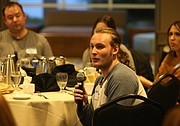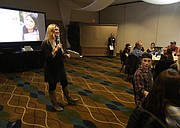Inside the teenage mind
By DEVIN WEEKS
Staff Writer
COEUR d’ALENE — At first, the conversation was just a trickle.
A few nervous laughs. Questions quietly asked.
Before long, the nerves evaporated and the dialogue between parents and teenage volunteers began to flow: When is it OK to talk to your parents about sex? What should teens know about birth control? How much social media is too much? What the heck is Snapchat?
These questions were posed in a safe and nonjudgmental space Thursday night during the fourth annual Bridging the Gap event, held at the Best Western Plus Coeur d’Alene Inn.
“I feel like a lot more kids these days are growing up a lot faster than they should be,” said Aurora Dougherty, 16, of Rathdrum. “This helps parents look out for what they need to look for, what they don’t need to look for, how they should approach their kids with certain subjects.”
About 30 parents attended the function, where Dougherty and seven other local teens offered themselves up as resources for parents who might be struggling to talk with their own kids about some of the most personal, private and often uncomfortable but incredibly important topics.
“It’s nice to give them the understanding from a teenager and let them pick your brain a little bit,” said Dougherty, who also volunteered last year. “It helps them a lot. They really appreciate it, and it’s always nice to do a good deed.”
Presented by Panhandle Health District, Bridging the Gap included dinner in a casual environment as health education specialist Alicia Keller emceed and kept the evening on schedule. The teens rotated between tables of parents, spending about 15 minutes fielding questions and giving their honest opinions from their own experiences.
Trust, understanding, responsibility, open-mindedness, faith, love and family values were discussed at every table. Many of the teens urged the other teens’ parents to try to understand what’s going on in their kids’ world before they jump to conclusions.
Are their sons or daughters under pressure to have sex? Has there been a recent breakup? Are they bored in school? Who is their biggest influence right now? Are they embarrassed or hurting but don’t know how to talk about it?
Social media was a huge topic of discussion, with questions ranging from “When should my child be allowed to use it?” to “How do I know what my kid is doing on social media without invading his privacy?”
Andreas Estrada, 15, said he recommends kids don’t jump into the world of social media until they’re mature enough to know the ramifications of their words and actions.
“The moment you can truly understand yourself is when you can start to understand others,” he said.
PHD health educator Tina Ghiraduzzi said Bridging the Gap is important because “it really provides an opportunity for parents to get the tools necessary to have sensitive conversations at home in a way that’s comfortable for them and to really learn from the perspective of a teen.”
She and Keller both emphasized that it shouldn’t just be “the talk” or a single conversation parents have with their teens about sex, healthy relationships, responsible decision-making and related topics.
“It should be a conversation through a lifetime,” Ghiraduzzi said.
Parents Jim and Ivy McElwain of Rathdrum have three kids together, two in their 20s and one teen still at home. They attended Bridging the Gap to strengthen their communication abilities and have a better understanding of what’s going on with their teen.
“It’s good to just hear from other teens beside your own,” Ivy said. “It’s good to hear what they have to say because a lot of them are the same age as our teen right now. It’s really good to hear their view on things that we’re having a problem with. They really brought up the same issues we’re dealing with.”
“We think that our teen isn’t even listening to us,” Jim said, to which Ivy added, “We realize they are listening.”





